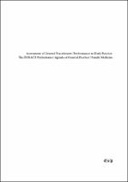Explore

Assessment of General Practitioners' Performance in Daily Practice
Stefan Wilm (editor)
2014
0 Ungluers have
Faved this Work
Login to Fave
The EURACT Performance Agenda (EUPA) of the European Academy of Teachers in General Practice/Family Medicine (EURACT) is the third paper in a row following the European Definition of General Practice/Family Medicine (WONCA Europe) in 2002 which identified 6 core competencies and 11 abilities every general practitioner (GP) should master, and the EURACT Educational Agenda in 2005 which provided a framework to teach the core competencies by setting learning aims and monitoring their achievement. Performance (in contrast to competence) is understood as the level of actual performance in clinical care and communication with patients in daily practice. Small groups of EURACT Council members from 40 European countries have discussed and developed EUPA since 2007. EUPA is a general, uniform and basic agenda of performance elements every GP masters in daily practice, applicable and adaptable to different countries with different systems. It deals with the process and result of actual work in daily practice, not with a teaching/learning situation. EUPA discusses in depth the psychometrics and edumetrics of performance assessment. Case vignettes of abilities in GPs’ daily practice illustrate performance and its assessment in every chapter. Examples of common assessment tools are workplace-based assessment by a peer, feedback from patients or staff and audit of medical records. EUPA can help to shape various performance assessment activities held locally in general practice/family medicine, e. g. in continuing professional development cycles, re-certification/re-accreditation/licensing procedures, peer hospitation programmes and practice audit programmes in quality management. It can give orientation for self-assessment for reflective practitioners in their continuing professional development. The EURACT Performance Agenda (EUPA) encourages general practitioners to initialize performance agendas adapted to their national health system to further strengthen the role of general practice/family medicine in their country.
This book is included in DOAB.
Why read this book? Have your say.
You must be logged in to comment.
